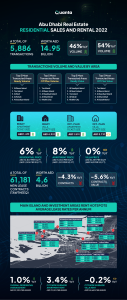Real estate records were broken in 2022, with the latest figures on Abu Dhabi’s real estate residential market showing sales transactions in Abu Dhabi increased by 54 percent in 2022 to AED 14.95 billion from 5.886 transactions (an increase of 46 percent).
Demand has been buoyant, underpinned by significant interest from international investors in the off-plan market, while solid demand and price gains in the luxury market also buoyed the market. Yas Island topped the list for the highest value of off-plan transactions, with Al Saadiyat Island topping the most transacted location based on value.
Despite the global challenges, the region has maintained its standing as a world-class real estate market and investment destination, experiencing a surge in long-term investments supported by strong confidence in the country’s strengthening economy. Only last month, the Central Bank of UAE raised its outlook for the UAE’s economic growth in 2022, with real GDP projected to grow by 7.6 percent; although this has been revised down for 2023, it is still forecast to come in at around 4 percent.
The question is whether Abu Dhabi and UAE can buck the real estate trend that shows signs of a slowdown in the West, where higher interest rates and inflation are beginning to have a detrimental impact on housing markets. There a several reasons to be optimistic that it can.
Interest rates affect buyers less in the UAE, with the majority of transactions cashed-based. The UAE is a millionaire magnet, with some 4,000 ultra-high-net-worth individuals (UHNWIs) projected to flow into the country last year – more than any other country. The reopening of China following its lifting of Covid restrictions could buoy sales. Notably, as our graphic shows, there is no sign of a housing bubble (prices for villas remained flat last year, for instance). Average prices aren’t rising at soaraway and unsustainable levels. This shouldn’t be a surprise, given how depressed the UAE’s housing market was for several years after 2014.
Abu Dhabi’s long-term real estate growth story also remains intact, underpinned by several major initiatives that aim to transform the region from an oil-based economy into a sustainable economy. The sector is expected to flourish and capitalize on the government-led ‘Industrial Strategy’, which is investing AED 10 billion to more than double the size of Abu Dhabi’s manufacturing sector to AED 172 billion, create 13,600 skilled jobs and increase Abu Dhabi’s non-oil exports by 143 percent by 2031.
It will also be buoyed by the Ministry of Industry and Advanced Technology (MoIAT) strategy, known as Operation 300bn. These two initiatives come with almost $1 trillion worth of infrastructure and real estate via ‘mega projects’ already planned across the region as governments look to transform economically and socially.
The global economic landscape is challenging, but the prognosis for residential real estate in Abu Dhabi is healthy. It is a unique location, which in many ways, is insulated from the storms that are impacting much of the world, pointing to another strong year.







